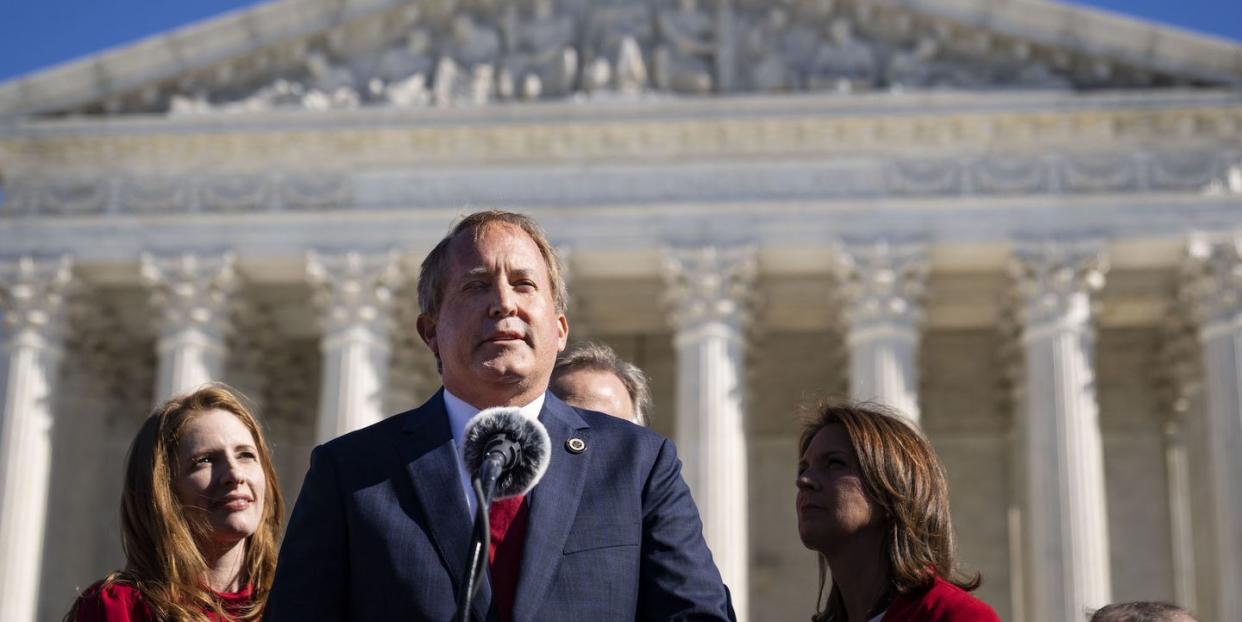The Texas Abortion Law Isn't a Law. It's a Scheme.

On Monday morning, the Supreme Court took up challenges to the draconian anti-choice Texas law. This, it should be noted, is probably the preliminary bout to the main event later this fall in Dobbs v. Jackson Women’s Health Organization, a case that directly attacks Roe v. Wade. The way you know this is that even the conservative justices known to be pro-life, including Chief Justice John Roberts, all treated the Texas law as the Clever Dick scheme it was designed to be, especially the section in which it essentially deputizes anyone through the payment of a $10,000 bounty. The law's authors saw this as a way to finagle it past previous Supreme Court rulings—and by god, that’s their job, dammit, and they’ll get to it in their own good time. I mean, even Justice Amy Coney Barrett argued that the law was jury-rigged to keep the providers in Texas from availing themselves of a “full constitutional defense” against it.
Judd Stone II, the Texas solicitor general tasked with defending the law, found himself without many allies. Almost all the justices took what sounded like personal offense at the presumptive chicanery of how the law was designed. Chief Justice Roberts, arguing Stone down about the “chilling effect” the bounty provisions of the law would have on people seeking even abortions that still would be legal under the Texas law, asked Stone if he thought a million-dollar bounty would chill the exercise of rights under Roe. All the court’s conservatives wanted Stone to explain how, if Texas can deputize the population against abortion, what’s to keep other states from offering bounties on people who violate gun laws? And Justice Sonia Sotomayor chimed in on a similar theme:
How about in Obergefell, imposes S.B. 8 style liability on anyone who officiates, aids, or abets a same sex wedding? How about, dissatisfied with Lawrence vs. Texas, subjects private consensual sexual conduct of which it disapproved to the exact same law as S.B. 8? How about Griswold, the use and sale of contraception is subject to S.B. 8 style liability? So this is not limited to abortion. That's the point that's been raised. It’s limited to any law that a state thinks it’s dissatisfied with.
Stone should’ve known he was in trouble when Justice Stephen Breyer threw the terms “interposition” and “nullification,” as well as the names of Justice Oliver Wendell Holmes and John C. Calhoun, at him. Nobody arguing even a tacit states' rights position wants to hear that. Justice Elena Kagan also dropped a new name for what Stone was defending: “unpreferred constitutional rights,” meaning that if a state doesn’t like a ruling regarding constitutional rights, it can simply raise a civilian posse against it. And she wasn’t finished yet.
But, General Stone, I think it's the combination of everything, you know? It's the $10,000 and it's everything that Justice Kavanaugh said and it's other provisions behind. And we've had a little experiment here, and we've seen what the chilling effect is. You know, usually, in these chilling effect cases, we're kind of guessing. Well, I—this would sort of chill me. Here, we're not guessing. We know exactly what has happened as a result of this law. It has chilled everybody on the ground.
The fact that, after oh these many years, some geniuses came up with a way to evade [that precedent, and] the even broader principle that states are not to nullify federal constitutional rights, and to say ‘Oh, we’ve never seen this before so we can’t do anything about it’ ... I guess I just don’t understand the argument.
Stone, as it was once said, left the ring in a blanket.
This was not a law. It was a scheme. It trod all over the Supremacy Clause of the Constitution, as well as the 14th Amendment and the right to privacy therein contained (at least for the moment). It did it so clumsily and obviously that it even offended Justice Kavanaugh, who saw right through it. I think the Court is going to rule that the challenges to the law be upheld and that, someday in the future, Senate Bill 8 will be declared really, most sincerely dead.
Of course, by then, Roe v. Wade might be joining it anyway. And if so, Justice Kagan probably provided the best elegy when she asked Judd Stone the following:
Your answer to Justice Kavanaugh, which is, ‘Go ask Congress,’ I mean, isn’t the point of a right that you don’t have to ask Congress? Isn’t the point of a right that it doesn’t really matter what Congress thinks or what the majority of the American people think as to that right?
Always thought so, yes.
You Might Also Like


